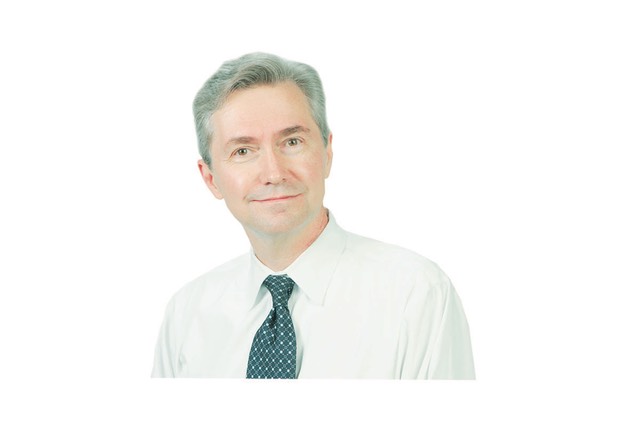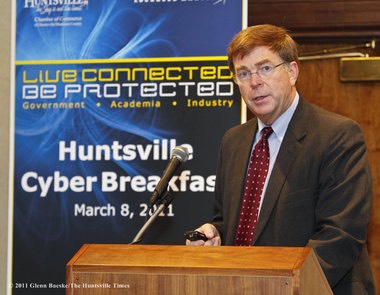Cyber security called both a 'critical mission' and opportunity for Huntsville
Published: Wednesday, March 09, 2011, 6:30 AM
HUNTSVILLE, Alabama -- Countering the global and growing computerized and electronic threats to U.S. security could be an opportunity for high-tech Huntsville's work force, according to government, academic and industry leaders who gathered for a "cyber breakfast" Tuesday."This is such a critical mission area," said retired Army Lt. Gen. Dennis Cavin, vice president of Huntsville Operations for Lockheed Martin, which sponsored the event with the Huntsville-Madison County Chamber of Commerce. He has been a victim of cyber attacks, having his personal information and identity stolen and finding malware on his "secure" computer.
He said it was a "humbling" experience, but it's frightening to think about attacks that could shut down a financial system, the exchange of vital information along the Internet or the supply of energy.
"Imagine a nation brought to its knees by denied access," Cavin said.
Huntsville can play a key role in keeping that from happening, said Brian Hilson, president and CEO of the chamber. He pointed out the area has a history of rising to meet technological challenges, including moon landings and missile defense.
"We want to leverage what this community does, and does best," said Huntsville Mayor Tommy Battle, who introduced a "Cyber Huntsville" plan about a year ago. Teams have been created to bring a major cyber security conference to Huntsville, develop a common lexicon for discussing the issues, make sure those issues are addressed at the Space and Missile Defense Conference and other meetings, and much more.
Traditionally, land, sea, air and space have been the domains of war, said Laurence Burger, director of the Army Space and Missile Defense Command's Future Warfare Center. Cyber is a new, unbounded, global, nearly instantaneous domain of warfare that affects all the others.
It is requiring the development of new techniques and skills, because it is so easy for an enemy to disguise or hide the hostile act.
"How do you 'return fire' if you're not sure who attacked you?" Burger said.
We must have ways in place to counter misinformation put out by terrorist groups and nations seeking to harm the U.S. or to influence their populations, he said. "We have to win the information war."
And, because computers and networks are pervasive - managing everything from a casual cell-phone text to ballistic missile defense systems - cyber security issues affect everyone.
"It's not just a government problem anymore," said Laurence Burger, director of the Army Space and Missile Defense Command's Future Warfare Center. When the nation is attacked, the cyber war could be waged against corporate, communication, financial, utility and all manner of vital computer networks or systems.
Cyber attacks will be the first weapons to fire, he said, the first indicator that we're going to war. So planning now for cyber security, both defenses and responses, is vital.
"It's going to be critical to our way of life," Burger said. "We are at the birth of a fledgling industry."
Other highlights from the meeting:
• Debra Wymer, director of SMDC's Test and Warfighter Solutions Center, outlined steps being taken in Supply Chain Risk Management to protect against the corruption of data and counterfeiting of critical parts and materials.
• Consultant Jess Granone, who has decades of experience in missile defense systems and with the SMDC, called for new ways of thinking to address cyber defense issues. In the missile defense world, it was pretty easy to simulate, model and measure damage, but how do we do that in the cyber world? We must consider new definitions of systems for protection - military, banking, electrical power - and of where networks start and stop. Ultimately, we need to move from a "physics-based mentality to a mathematically based mentality," he said.
• Dr. Yadunath Zambre, a senior fellow at Lockheed Martin, warned that "a determined adversary will find a way into your system" - and we have determined adversaries. They are a persistent threat, and defenses must include everything from training users of technology to create strong passwords and not click on the wrong e-mail to developing counter-security tools and systems. The intent is to get and stay ahead of the actual attack, he said.
The amount of work to be done is vast and so is the opportunity for North Alabama and its uniquely experienced research and development work force, Battle said.
"This is a community of visionaries," Hilson said, adding that Cyber Huntsville is another technology-based initiative that will set Huntsville apart.
In the years to come, the city could be a cyber security center of excellence with a global reputation and global reach, said Dr. Rodney Robertson, executive director of the Auburn University Research Center here.
"We want Huntsville to be a major node in this mega-community that makes up our nation's cyber capability," Robertson said.







